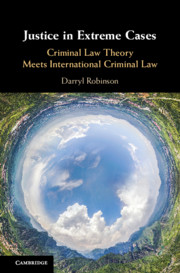Book contents
- Justice in Extreme Cases
- Justice in Extreme Cases
- Copyright page
- Contents
- Acknowledgements
- Cases, Statutes, and Other Authorities
- Abbreviations
- Part I Introduction and Problem
- Part II Proposed Solution: A Humanist, Coherentist, Deontic Account
- Part III Illustration through Application
- 6 An Unresolved Contradiction
- 7 The Outer Limits of Culpability
- 8 The Genius of Command Responsibility
- 9 Horizons: The Future of the Justice Conversation
- Book part
- Glossary of Selected Terms
- Bibliography
- Index
6 - An Unresolved Contradiction
from Part III - Illustration through Application
Published online by Cambridge University Press: 17 December 2020
- Justice in Extreme Cases
- Justice in Extreme Cases
- Copyright page
- Contents
- Acknowledgements
- Cases, Statutes, and Other Authorities
- Abbreviations
- Part I Introduction and Problem
- Part II Proposed Solution: A Humanist, Coherentist, Deontic Account
- Part III Illustration through Application
- 6 An Unresolved Contradiction
- 7 The Outer Limits of Culpability
- 8 The Genius of Command Responsibility
- 9 Horizons: The Future of the Justice Conversation
- Book part
- Glossary of Selected Terms
- Bibliography
- Index
Summary
At this moment, the literature and discourse on command responsibility is incredibly convoluted and controverted. I will show how these knots were produced by an underlying inadvertent contradiction with the culpability principle. The contradiction was created by surface-level doctrinal reasoning that did not adequately consider the deontic dimension. The subsequent twists and turns to deny, obscure, evade, or resolve this contradiction have led to increasingly complex and obscure claims about command responsibility.
The inquiry demonstrates the problems of inadequate attention to deontic limits. It also shows how deontic analysis can help us better understand the trajectory of the command responsibility debate. We can see old controversies in a new light and generate new prescriptions. I argue that command responsibility can be restored to its simple and elegant origins if it is recognized as a mode of accessory liability. As a result, the causal contribution requirement should be respected. This solution is not perfect, but I will show that this is the best reconciliation of the text, precedents, and the culpability principle. By resolving the core contradiction, the myriad complications and mystical evasions about command responsibility become unnecessary.
Keywords
- Type
- Chapter
- Information
- Justice in Extreme CasesCriminal Law Theory Meets International Criminal Law, pp. 143 - 176Publisher: Cambridge University PressPrint publication year: 2020

